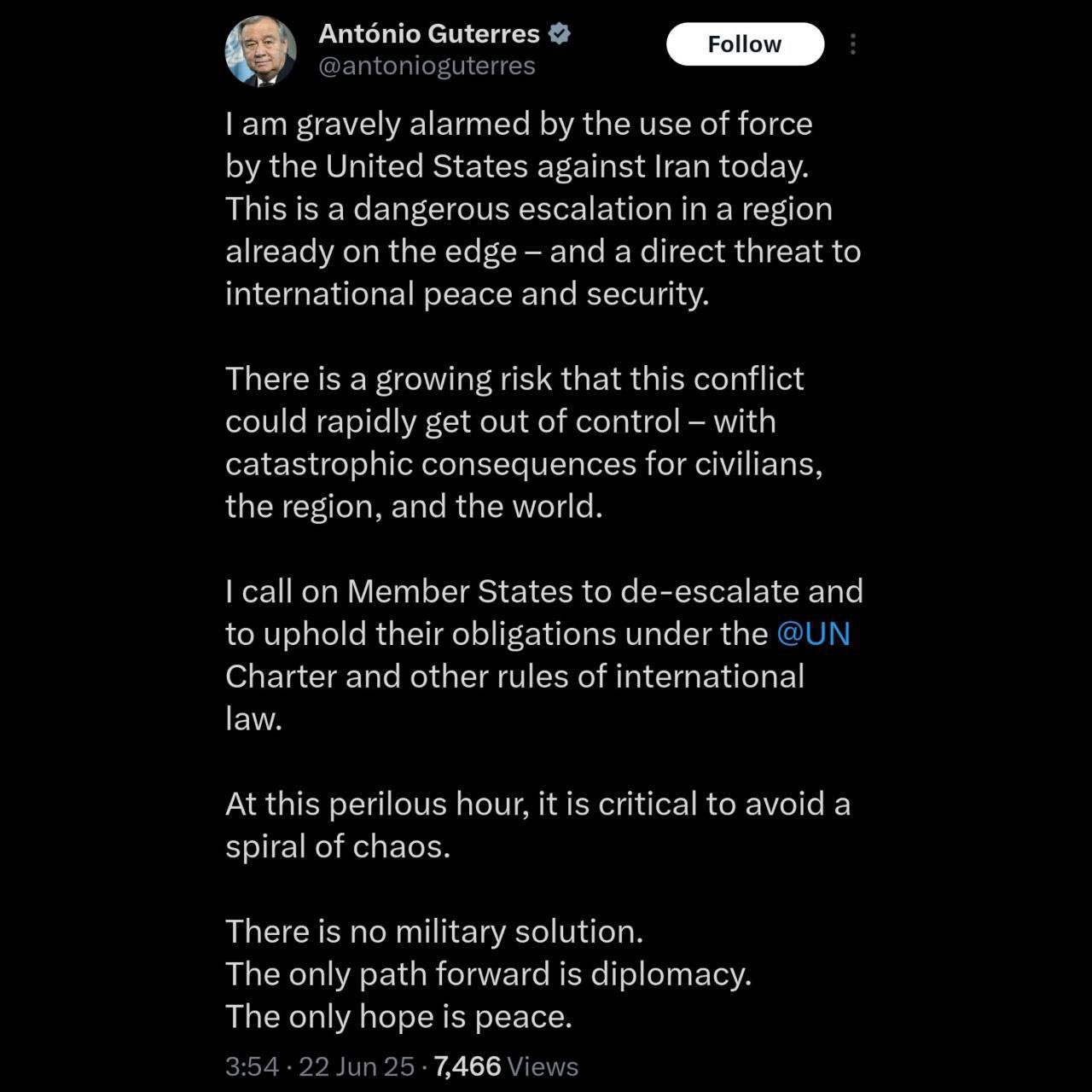As the United States struck three of Iran’s most crucial nuclear facilities, governments across continents expressed alarm, urging calm, restraint, and a return to diplomacy. The airstrikes, which marked Washington’s formal entry into Israel’s campaign against Tehran on Saturday, raised fears of a wider regional conflict in the Middle East.
While the extent of the damage remains uncertain, the geopolitical fallout has been swift. United Nations Secretary-General António Guterres warned of the “catastrophic consequences” if the situation escalates further.
“There is a growing risk that this conflict could rapidly get out of control – with catastrophic consequences for civilians, the region, and the world,” Guterres said in a statement posted on social media platform X. “There is no military solution. The only path forward is diplomacy.”

President Donald Trump had earlier said he would decide within a fortnight on American involvement in the Iran-Israel conflict. Instead, the US acted within days, deploying stealth bombers to strike the heavily fortified sites at Fordow, Natanz, and Isfahan.
Tehran has vowed retaliation, while allies and adversaries of the US alike issued strong responses.
Latin America voices strong disapproval
Some of the most forceful reactions came from Latin American leaders. Cuban President Miguel Díaz-Canel decried the strikes as a “dangerous escalation” and a “serious violation of the UN Charter”.
“It plunges humanity into a crisis with irreversible consequences,” he stated.
Chilean President Gabriel Boric was equally vocal, condemning the US action outright.
“Chile condemns this US attack,” he wrote on X. “Having power does not authorise you to use it in violation of the rules that we as humanity have given ourselves. Even if you are the United States.”
Mexico opted for a more measured tone but stressed dialogue as the only way forward.
“In keeping with our constitutional principles of foreign policy and our country’s pacifist conviction, we reiterate our call to de-escalate tensions in the region. The restoration of peaceful coexistence among the states of the region is the highest priority,” read a statement from the Mexican Foreign Ministry.
Venezuela, in a message posted on Telegram, said it “firmly and categorically condemns the bombing carried out by the US military, at the request of the state of Israel”. Foreign Minister Yván Gil urged an “immediate cessation of hostilities”.
Also read: No radiation leak at nuke sites after US bombings, confirms Iran
Asia-Pacific leaders express alarm
In the Asia-Pacific, New Zealand’s Foreign Minister Winston Peters called the crisis “the most serious I've ever dealt with” and stressed that diplomacy offered the only durable solution.
Japan’s Prime Minister Shigeru Ishiba convened a cabinet-level meeting to assess the fallout. Leading Japanese dailies printed extra editions, underlining the gravity of the moment.
South Korea also held emergency talks, focusing on security implications and potential disruptions to trade and energy supply chains.
China, through its state-run CGTN, issued a sharp critique of Washington’s move. “Is the US repeating its Iraq mistake in Iran?” the outlet asked. “History has repeatedly shown that military interventions in the Middle East often produce unintended consequences.”
Australia cautious, urges diplomacy
Australia, which had already evacuated its diplomatic staff from Tehran, called for restraint while acknowledging the threat posed by Iran’s ballistic and nuclear ambitions.
“We note the US President's statement that now is the time for peace,” a government spokesperson said. “The security situation in the region is highly volatile. We continue to call for de-escalation, dialogue and diplomacy.”
As military posturing increases across the Gulf, and global capitals scramble to contain the diplomatic fallout, the question remains: will diplomacy prevail, or has the world crossed the threshold of a new war in the Middle East?


